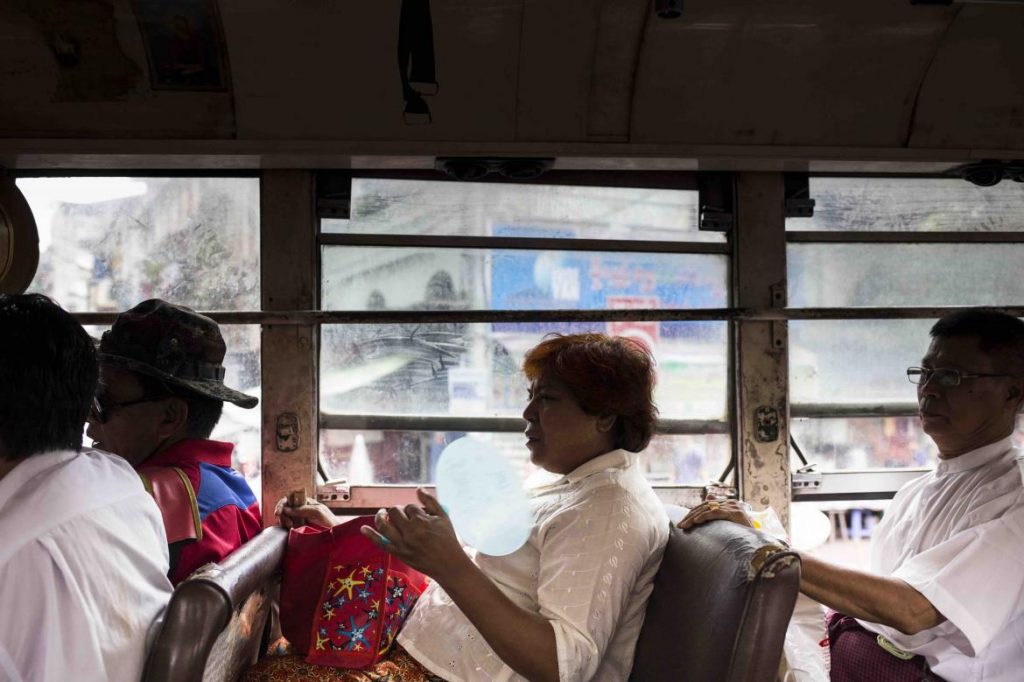On October 30, the Yangon regional government launched the Yangon Public Bus Company offering a new Bus Rapid Transit service, with shares in the new company being sold to the public starting on Monday, although crony companies have already snapped up most of the equity.
Dr Maung Aung, an adviser to the Ministry of Commerce, was appointed the chairman of the company. Yangon Region Chief Minister U Myint Swe, Yangon Mayor U Hla Myint and the Yangon regional government transportation minister, U Aung Khin, are patrons of the company.
U Myint Swe said in a speech at the launch that as well as being the first public transport company, YPBC would also be the first in Yangon to use new vehicles. He encouraged investment in the company, which will sell 60 percent of its shares to the public. But it’s unlikely many members of the public will have an opportunity to buy shares in the Yangon Public Bus Co.
Selling to the public?
Of Yangon Public Bus Company’s paid up capital of K25 billion (about US$19.5 million), the Yangon government will invest K10 billion. Another K15 billion will be raised from the sale of shares to the public. However, K10 billion of the K15 billion in shares to be sold to “the public” has already been snapped up by five prominent companies: Capital, Shwe Taung, Shwe Than Lwin, Zeya & Associates and Fishing & Marine 2000 Products.
By the time the public was able to bid for the remaining shares on November 2, 66 percent had already been acquired by well-connected companies.
Support more independent journalism like this. Sign up to be a Frontier member.
Of the YPBC’s nine board directors, four are from the government and there is one each from the five companies. Dr Maung Aung said the four government directors are classified as Class A and are responsible for policy. The five private sector board members are Class B directors, responsible for policy implementation and management. There is no board member to represent the interests of ordinary private shareholders.
“If they call it a public company, then the company should really be owned by the public,” said Daw Nyo Nyo Thin, an independent Yangon Region MP who is seeking election to the Pyithu Hluttaw in Yangon’s Bahan Township.
“If they are just benefitting a few people who are close with the government, there will be a negative impact on most of the public,” she told Frontier.
More traffic jams?
Research by JICA found that unless the government invests an estimated $10 billion in upgrading Yangon’s roads, the city’s swelling fleet of vehicles will be averaging speeds of less than five miles an hour (eight kilometres an hour) by 2035. Serious traffic congestion had already resulted in an average speed of about 18 mph (30 km/h), the research found.
The Yangon government has said it will enforce the exclusive use of right-hand lanes for the rapid bus transit service. Private bus owner U Aung Myint predicts that there will be conflicts when the rapid transit service starts because bus companies are already using the right-hand lane.
Dr Maung Aung acknowledged that the YPBC’s fleet would probably be blocked by other buses but said the rapid transit service would be faster because its vehicles would not stop at every stop. The new service will stop at one third of the existing stops, thus speeding up the journey for passengers, he said.
Regulatory questions
As well as the possibility of conflicts over bus lanes, U Aung Myint, who owns three buses, said he was concerned that private bus owners would not receive fair treatment in the event of a dispute with YPBC.
“I worry about if we have dispute with BRT, they would get the favour of authorities because the bus line is joint-owned by government,” U Aung Myint said.
There is no regulator yet for this new bus line. The Transportation Act for Yangon Region has been enacted by the regional hluttaw, but until the bylaws are released, a regulatory body cannot be established. The management bodies of the city’s bus lines are private groups with a legal status similar to that of non-government organisations and cannot regulate new lines. There is no public entity to deal with any conflict that may occur.
When Frontier asked who will regulate the new service, Dr Maung Aung could not answer, and referred the question to members of the regional government. Chief Minister U Myint Swe and other ministers at the launch declined to comment.
In December, 65 buses for the BRT service are due to arrive in Yangon. They are scheduled to go into service in the first week of January and will ply routes on Pyay and Kabar Aye Pagoda roads, which serve about 700,000 passengers a day.
Observers have questioned the timing of YPBC’s launch days before the November 8 election, which is likely to be followed by a reshuffle of those in power.
“The regional government has taken advantage [of the situation] before they have to hand over power,” said Daw Nyo Nyo Thin.



